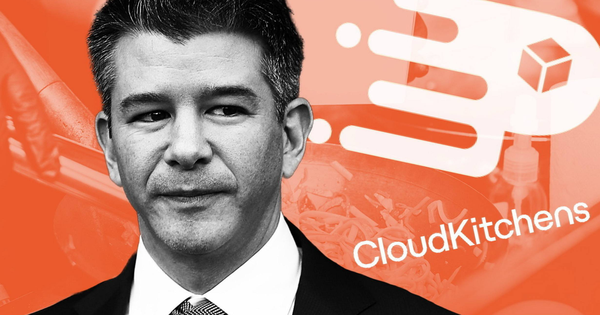The ’empire’ of the $ 15 billion kitchen of the former Uber CEO
- Tram Ho
The Financial Times reports that Travis Kalanick – Former CEO and co-founder of Uber has quietly built a food and convenience goods business across Latin America. This comes as Kalanick is looking to capitalize on the region’s fastest-growing e-commerce market.
The billionaire has rapidly expanded US-based startup CloudKitchens by purchasing and building “cloud kitchens” in Latin America over the past three years as part of a plan to build a worldwide network of restaurants. food delivery hub, leveraging his experience building Uber Eats during his tenure as CEO.
Along with the “cloud kitchen” business – used only as a preparation space for takeout or delivery, Kalanick also launched Pik N’ Pak. The business stores convenience goods, such as pet food and medicine, from nearly 50 CloudKitchens locations across 11 cities in Brazil, Mexico, and Colombia. As well as the activities in the kitchen, Pik N’ Pak merchandise is delivered to customers by local delivery app companies.

The connection between Pik N’Pak and CloudKitchens was previously undisclosed. Accordingly, as part of a secret expansion plan, local units kept their distance from the parent company to avoid involvement with Kalanick.
” When you have a CEO as influential and controversial as Travis, he doesn’t want to associate brands with him ,” according to a former manager at CloudKitchens.
This comes as Kalanick has rapidly grown CloudKitchens globally since acquiring the company in 2018 after being kicked out of his position as Uber CEO in 2017. CloudKitchens was valued at $15 billion in November following a round of calls. capital of 850 million USD.
CloudKitchens has more than 4,000 employees globally.
Cloud kitchen – Kitchen in the cloud is a place where the restaurant owner does not receive any guests, but mainly they will order food to take home or work.
The culture of secrecy reflects Kalanick’s approach to the business following his controversial departure from Uber.
Employees are prohibited from mentioning they work at the company on LinkedIn, instead stating only at “stealth startup” – a term usually reserved for companies that have not IPOed.
” This issue is related to him being attacked in the past ,” said a former employee at CloudKitchens. ” Uber’s situation is not fun for him. Now he just wants to develop CloudKitchens in Latin America, doesn’t want to attract too much attention and wants to dominate the field .”
However, people familiar with Kalanick say his approach poses risks to the company’s growth and bears the mark of his time as an Uber manager. The famous Uber rules are also being applied at CloudKitchens.
CloudKitchens employs 500 people across Latin America, operates nearly 70 locations, including 1,800 personal kitchens across 8 countries.
Pik N’ Pak uses excess space in corporate kitchens such as basements or along hallways to stock up on convenience goods like medicine, pet food, and toys. In the promotional material, Pik N’ Pak says it gives retailers the ability to reach “millions of customers”.
CloudKitchen’s growth in the region has been driven by at least two acquisitions. In 2020, the company acquired a Mexican-based kitchen group called Nano for $20 million.
In 2019, in an undisclosed deal, CloudKitchens purchased a Colombia-based kitchen called Cocinas Ocultas – founded a year ago by two Italian entrepreneurs, Raffaele Sertorio and Edoardo Dellepiane.
The Cocinas Ocultas team has joined CloudKitchens operations across the continent. Under the Cocinas Ocultas brand, CloudKitchens currently operates in Colombia, Peru, Costa Rica, Panama, Chile and Ecuador. In Mexico, the company is traded as VirtualKitchens.
In Brazil, CloudKitchens operates as Kitchen Central and is the market leader. Spending on food delivery in the country increased by a quarter last year to $7.8 billion, according to GS&NPD research.
” Cloud kitchen operations are expected to account for 15% of this total “.
But the growth of cloud kitchens across Latin America has sparked controversy in some cities. The surge in São Paulo, the largest city in the Americas, has sparked an outcry from residents living nearby, with banners protesting the new establishments popping up in busy neighborhoods.
City Hall has proposed local regulation of such kitchens and earlier this year issued a temporary ban on issuing new permits.
People have complained about noise, smell, smoke and motorcyclists waiting outside to take orders. According to Cris Monteiro, a city official, a disgruntled local resident said his son was nicknamed “bacon” and bullied at school because of the bad smell on his clothes.
She said the company was in contact before the controversy broke out but still questioned whether they were willing to reach a compromise.
“ I understand the position of the business. They say they are legally established. To me, this answer does not express a desire to cooperate ,” she added. ” I don’t see them wanting to solve the problem together with the community .”
A former senior employee at CloudKitchens in Latin America said the company has become more sensitive to local business practices. But others close to Kalanick warn old habits may persist.
“The only thing Travis learned during his time with Uber was not to trust the press and not to trust venture capitalists, ” said a former senior person at the company.
Source: Financial Times
Source : Genk
